- Home
- T. Kingfisher
Seventh Bride Page 15
Seventh Bride Read online
Page 15
It shook its head and slid off her lap. She watched it trundle away into the darkened garden, and felt tears slick her face.
It was easier to cry in front of the hedgehog than it was to cry in front of Maria. Still—
Sobbing in a dark garden all night won’t get me anywhere.
She took a deep breath, felt it catch, held it anyway. Then another, then another.
The hedgehog tapped her knee.
She looked down.
It was holding a large, soft leaf.
“Lamb’s ear, huh?” asked Rhea, taking the leaf. She wiped at her face with it and tried to smile.
The hedgehog sighed. It curled up against her ankle, and together they waited out the long and final night.
CHAPTER TWENTY-ONE
She woke late in the morning. There was dew soaking her clothes and her neck was stiff.
“Rhea?” asked a voice hesitantly.
Rhea looked up. There was a woman standing there, a woman who looked very familiar, someone she knew from somewhere—
Oh.
“Mother?” said Rhea.
Her mother went down to her knees, ignoring the fact that she was wearing her very finest clothes. “Rhea—? Why are you sleeping out here?”
Rhea could not think of an answer. The moment drew out too long and her mother’s face shifted, the tiny muscles around her mouth going slack and old. Her skin, normally so dark, had grey undertones of worry.
“It’s gone wrong, hasn’t it, honey?” her mother whispered. “It’s not good, is it?”
Rhea shook her head mutely.
Her mother held out her arms and Rhea tumbled into them.
It was not a comforting hug, but one of fear and resolve. “I told your father,” her mother whispered. “I told him, but he said we had no choice.”
“You didn’t,” said Rhea, finding her voice. “You didn’t. You couldn’t have known.”
“I knew,” said her mother.
“You’d have lost the mill.”
“To hell with the mill,” growled her mother—her sweet, beloved mother, who scolded for any curse stronger than “darn.”
Rhea laughed jerkily, feeling her chest unknot a little.
“We’ll get you out of here,” her mother said. “We’ll go now. There are other places to go.”
Rhea shook her head, pushing away. The reality of the situation was still there, still huge and grim and her mother was no match for Crevan. “No,” she said. “No, we can’t. No—I mean really. He’s a sorcerer, mother, a bad one. You can’t get out of this place unless he lets you.”
Her mother absorbed this in silence.
“I—I can’t tell you much more,” said Rhea. “He might be listening. He can—it’s a thing he can do, listening. I’m sorry!” The expression on her mother’s face made her heart ache again. “I have to do this!”
Her mother reached out and caught her upper arms, her face fierce. “If you’re doing this to protect the mill—”
“And you,” said Rhea miserably. “And all of us. It’s not just me. We can’t get away. There’s Maria and Sylvie—oh, hell. Come and talk to Maria. I can’t explain.”
They walked into the kitchen together. Maria looked up. “You found her,” she said.
Rhea’s mother nodded. Her lips were tight and bloodless.
The cook reached over and laid her hand on Rhea’s mother’s fingers, where they dug into the back of a chair. “It will be all right,” she said.
Perhaps there was a little magic in it. Rhea was never sure if Maria had been telling all the truth about her magic being taken away. Regardless, her mother exhaled, long and slow, and stood a little straighter.
“You found her,” said Maria again.
“How did you find me?” asked Rhea. It occurred to her suddenly that if her mother were in the house, her father might be too—and the priest and the Viscount and members of the wedding party. They would probably avoid the kitchen, but still…
Perhaps she had been in the house too long, with too few souls. The notion of other people filled her with sudden grey panic.
What if they see what’s happening? They can’t help—they’ll make it worse—it could be so much worse—if my parents are here—
“The mother of the bride is allowed to wander the house, looking for her daughter,” said Maria firmly. “The other guests are in the courtyard. That’s where Ingeth has been putting the food.” She nodded to Rhea’s mother. “Will you be a dear, and go see if you can see Ingeth? A tall woman, with a scarred throat. Tell her we need the dress brought down. It’s almost time.”
“It can’t be almost time,” said Rhea, when her mother had gone. Her face felt sticky and her hair was limp. “I don’t—I’m not—I can’t get married like this!”
Maria sighed. “Does it matter?”
It was embarrassing to admit that it did. Rhea felt that she should have been willing to be dragged to the altar in chains, with her hair in snarls, and yet the thought of being ragged and dirty and humiliated, in addition to being trapped, was infuriating.
“Why do we always want to dress up for the gallows?” asked Maria. “Never mind, child, that was rhetorical.”
“He’ll get mad if I look like a beggar,” said Rhea. “It’ll embarrass him in front of all his grand friends.”
“Not so many grand friends,” said Maria. “There’s only the Viscount and one or two of his hangers-on—and they don’t look any too comfortable. Himself is not as popular with the gentry as he’d like to be, I think.”
Rhea scowled. “Can’t he…I don’t know…get a charming wife and take it off her?”
I am joking about this. I am actually joking. Oh, Lady of Stones, I’ve gone mad and out the other side again…
Maria snorted. “If we fail, I’ll suggest it, shall I?”
“Ha,” said Rhea.
Maria moved suddenly, locking her arms around Rhea in a bear hug. Rhea started to squirm involuntarily, then realized what was happening.
“You are strong,” said Maria quietly. “If you fail, it won’t be for lack of trying. And if you fail, I won’t forget you. A witch’s memory is worth something, even if I’m hardly a witch at all anymore.”
She let go. Rhea blinked, feeling touched (and a little squashed) and not entirely sure if she had been honored or cursed.
“Here’s a comb,” said Maria briskly. “Wash your face in the scullery and get the knots out. You ought to have your hair up like a proper bride, but we’ll make do.”
And like that, the moment passed. Rhea went into the scullery, ran a little fresh water, and scrubbed her face. She would not be beautiful, but she could at least be clean.
“This is not how I pictured your wedding day,” said her mother from the door. She held the red dress a little away from her body, as if it might bite. “I thought—well—I suppose it doesn’t matter.”
Her mother’s grief was such a small sin to put on the ledger alongside Sylvie and the golem-wife and her own very probable death, and yet Rhea marked it anyway, inside her head. She would make Crevan pay for his crimes—or she would die, and someone else would come along, and she would be remembered only by her parents and by a woman who was no longer a witch.
Well.
Either way.
“I would probably still have gotten dressed in the kitchen,” Rhea said. She dredged up a smile from somewhere. It felt strange on her face. “And I’d rather have Maria here than Aunt, anyway.”
She put her arm around her mother, and noticed for the first time how thin her mother seemed, how fine and fragile the bones.
She hoped, if she died in the clock, that she would simply vanish and her mother might think that she had managed to run away. If not…well…if her gear-mangled body was spat out onto the tile, she hoped someone would have the sense to keep her mother from seeing it.
And if I do fail, and I vanish, and they think I’ve run, will Crevan take it out on you as well?
She was terribly a
fraid that he would. Perhaps she was dooming her family to homelessness and ruin, no matter what she did.
She could not even warn her mother, for fear that he was listening.
To hell with the mill, her mother had said.
I hope you meant that, mother. But I can’t let him keep doing this. I have to try.
She squeezed her mother’s shoulders once, hard, wishing that she could push the knowledge of what she was trying to do through the skin between them.
Her mother squeezed back.
Rhea took a deep breath. “Well,” she said. “I suppose it’s time to dress.”
There were no mirrors in the kitchen, but Rhea could tell by Maria’s expression that the dress was not an unmitigated success.
“You look lovely,” said her mother, but she sounded more like a woman at a funeral than a wedding.
“Indeed,” said a deep voice from the door. “Lovely.”
All three of them looked up toward Lord Crevan, and only Maria did not flinch.
“Miss Rhea,” he said. And to her mother, “Madam.”
Her mother curtseyed. She cast Rhea a frightened glance, but Rhea could not make her knees bend.
If I try in this dress, I’ll probably pop out all the stitches…
“Milord,” she said.
“I came to make sure that there were no difficulties,” he said.
There were a dozen things that Rhea could have said. She said none of them, because her mother was in the room.
He probably wouldn’t care that she saw me insult him. He probably wouldn’t even think of it. But if he did…
And even if he didn’t care, it would only upset her.
“I’m sure it will be fine, milord,” said Rhea quietly.
He smiled. “I have guests to attend to,” he said. “The Viscount has done me the honor of attending. I shall send Ingeth when we are ready.”
Rhea nodded.
He went away again. The sound of his boot heels on the tiles clicked into the distance.
Rhea’s mother let out her breath slowly. “He does not act like a man about to be wed,” she said.
Maria caught Rhea’s eye. “Yes, well. These things take people differently. Will you go out, ma’am, and come tell us when it is nearly time? I don’t think these stitches will hold for much longer, and if she needs to sit down, I’ll want to let out the hips.”
Rhea’s mother nodded and went out. Maria reached down under the table and plopped the hedgehog down in front of Rhea. “You’ve been poking me in the ankle for the last ten minutes,” she said. “Once would have been enough. I’m not so dense as all that.”
The hedgehog looked unrepentant.
“I’ve sewn you a pocket for stray hedgehogs,” said Maria. “It’s in the left sleeve. And take your knife.”
Rhea tucked knife and hedgehog into their respective positions. Her sleeves seemed unexpectedly heavy.
“Hopefully there’s nothing you’ll have to stab,” said Maria briskly. “But better safe than sorry.”
Rhea drank another cup of tea. Her hands were shaking and the weight of the mug steadied them. She could not hear the clock ticking from the next room, but she thought that she could feel it in her fingertips and her jaw and the small bones of her ears.
Nerves. It’s nerves.
Lots of brides are nervous— she thought, and had to put her forehead down on the table for a minute to stifle hysterical laughter. Maria gave her a level look, but did not comment.
Her mother did not return. Instead Ingeth came, and glared at them both. She made a brisk beckoning gesture to Rhea.
“Time, then,” said Maria. “Go on ahead, Ingeth. We’re coming.”
Ingeth shook her head and reached for Rhea’s wrist.
Maria, moving with startling speed, knocked the hand away. “You will not manhandle the bride on her wedding day,” she said icily. “She’ll get plenty of that from Himself, and you’re not starting. I said we’re coming.”
Ingeth tried to stare down Maria, failed miserably, and then looked away as if she hadn’t been trying. She shook her head, her lips pressed together, and stalked away.
“She suspects,” said Maria. “Doesn’t surprise me. Whether she’ll try to stop us, I don’t know. We have to go now.”
“I wanted to say goodbye to my mother,” said Rhea softly. “But there’s no time, is there?”
Maria sighed and took her arm. They walked across the tile floor together. “You’ll have plenty of time inside,” she murmured. “For all the good it does. Try not to die of old age.”
“That could happen?”
“It’s a clock, child.”
In front of the clock case, they stopped. Rhea licked dry lips.
Maria put her hand on the clock case and murmured a word.
The clock opened.
“I thought you didn’t have any magic left,” said Rhea, feeling unexpectedly betrayed.
“I might have exaggerated a bit,” said Maria.
Rhea stared into the clock. A pendulum swung back and forth. Gears ground together. How was she supposed to get in?
The hedgehog squirmed in her pocket. She pulled it out and set it down on the ground.
It trudged resolutely forward, into the clock, and vanished under the pendulum. Was there an entry there?
Rhea knelt down. The dress’s seams groaned and a hasty stitch popped.
There looked to be a passage—a very small one, barely big enough for her head, never mind her shoulders—
“Go!” hissed Maria. “I’ll hold the way open, but you have to go! I don’t trust Ingeth!”
“But I can’t fit—” began Rhea.
Maria put one foot square on her red-clad backside and shoved.
Rhea fell out of the world and into the clock.
CHAPTER TWENTY-TWO
It was dark. Then it wasn’t.
Rhea crawled forward on her knees and forearms, through what felt like a dark tunnel, feeling the weight of metal mechanisms over her head—and then there was light and she was not in a tunnel at all.
She was on a vast plain covered in checkerboard tile.
She stood up, rubbing her rear end where Maria had shoved her. She was a bit annoyed about that, but this did not seem like the time to dwell on it.
The plain seemed to stretch in all directions. If she had come from a tunnel, it had vanished. The light came from overhead, a dull, directionless illumination.
Whatever Rhea had been expecting, it wasn’t this.
“Hello?” she called. “Hello?”
Should I call her name? What is her name? I can’t just call her “Clock-wife” can I?
Sure. Then she can call me “Girl-wife.” This’ll work out well.
“Hello?” she tried again.
She looked around for the hedgehog, but it didn’t seem to be there either.
Well, the tile is the same as in the manor house…
For lack of anything better to do, she set out briskly in no particular direction.
At least I won’t go in circles…
By keeping her feet firmly on a line of tile, she could be sure that she was going straight ahead and not wandering in any direction.
Which is useful. I guess?
She walked for a few minutes and then stopped because staring at the horizon was making her eyes cross. She was starting to wish that the tiled floor in the manor house had been something other than checkerboard. Perhaps a nice solid terra cotta. Something that didn’t seem to jitter and wiggle off in the distance.
She scanned the horizon in all directions and did not see the hedgehog.
I hope it’s okay…
The world went BONNNNGGG.
It was the crashing grinding noise of the floor falling, magnified ten thousand times. The bones in her ears thrummed with the noise and her ribcage seemed to flex in on itself, unable to contain it. Her heart pounded against the sound, each beat feeling sticky, as if it were trapped in a wall of glue.
Rhea
dropped to the ground and curled up in a ball, trying to fit herself onto a single tile. Another seam in her dress popped.
If it falls, I’ll fall with it, what do I do can I ride it down oh god, oh god, it’s so loud—
The tile she was on shot upward.
She had an instant to think, Wait, this is backwards— and then she was riding the tile upward, into the sky.
The force of the rushing air pinned her against the tile, which was good. She found an edge with her hand and curled her fingers around it. If the tiles fitted into others, somewhere up above, she might get her fingers crushed, but if she fell, she would lose a lot more than fingers.
She could not see because the wind made her eyes tear up, and even though she thought she was screaming, she could not hear through the sound of the clock.
Oh, Lady of Stones, let the hedgehog have gotten away! It can’t hold on through this—it’ll get blown off—crushed—please let it be somewhere else—
She clung to the tile and eventually she stopped screaming because it didn’t seem to be helping. The wind blew against her face and her fingers were so cold she could hardly feel them anymore.
She did not sleep—sleep would have been impossible, not to mention insane—but she went away in her head to a place that was a little like sleep. She did not think, she did not act, she lay on the tile and the wind hammered against her. Fragments of images danced in her head, one step short of dreams.
A long time later, or what felt like a long time later, the wind seemed to slacken. She opened her eyes.
She was sitting up on the edge of a beach. The tile underneath her was obscured by small black pebbles. The wind was blowing in from the water, and it smelled of salt and ice and cold.
Rhea took a deep breath, sobbed once, and then shoved the rest down. She had no time—or she had plenty of time, she wasn’t sure—but it would do no good either way. She stood.
It was strangely quiet and strangely loud, all at the same time. The water slopped against the beach, an endless over-and-under of sound, and yet there was a silence over the whole place. The wash of the waves muffled any other sound. She had never seen anything like it, because, in her whole life, Rhea had never seen the sea.

 Paladin's Strength
Paladin's Strength The Twisted Ones
The Twisted Ones The Hollow Places
The Hollow Places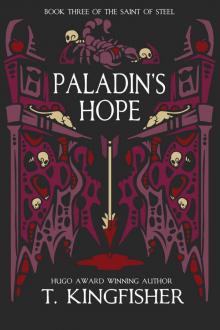 Paladin’s Hope: Book Three of the Saint of Steel
Paladin’s Hope: Book Three of the Saint of Steel Swordheart
Swordheart Jackalope Wives And Other Stories
Jackalope Wives And Other Stories A Wizard's Guide to Defensive Baking
A Wizard's Guide to Defensive Baking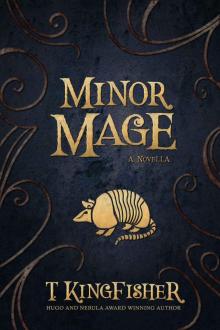 Minor Mage
Minor Mage The Halcyon Fairy Book
The Halcyon Fairy Book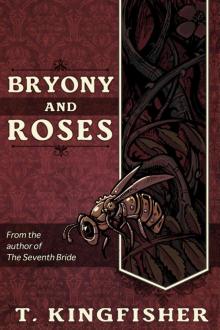 Bryony and Roses
Bryony and Roses The Wonder Engine_Book Two of the Clocktaur War
The Wonder Engine_Book Two of the Clocktaur War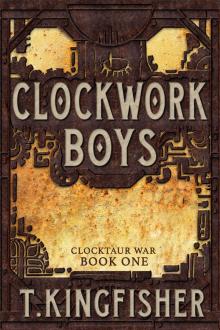 Clockwork Boys: Book One of the Clocktaur War
Clockwork Boys: Book One of the Clocktaur War The Raven and the Reindeer
The Raven and the Reindeer Summer in Orcus
Summer in Orcus The Wonder Engine
The Wonder Engine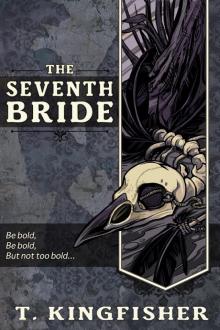 Seventh Bride
Seventh Bride Toad Words
Toad Words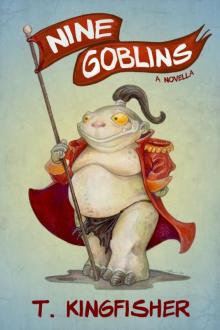 Nine Goblins
Nine Goblins